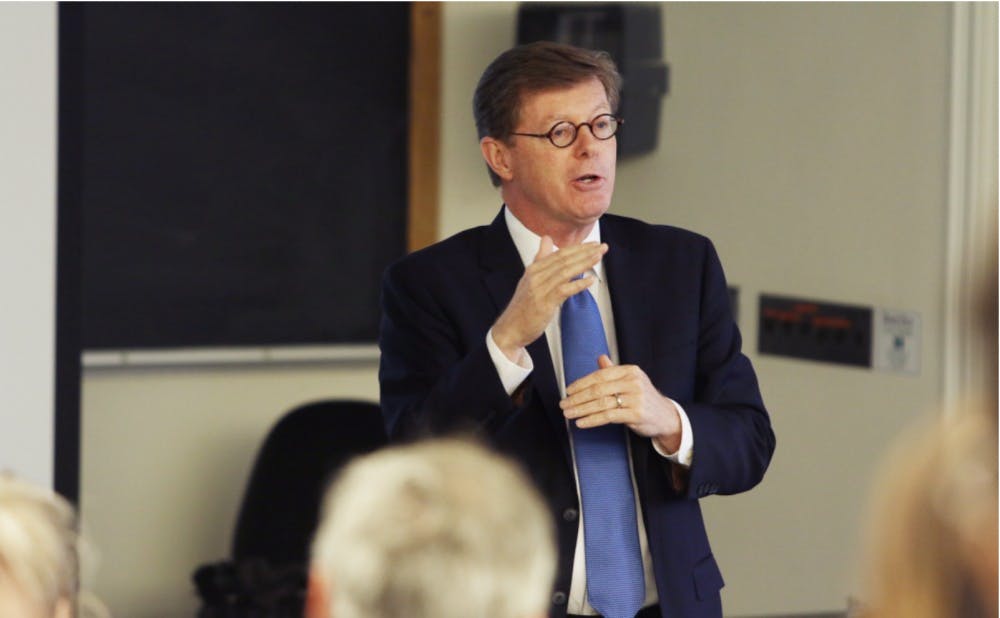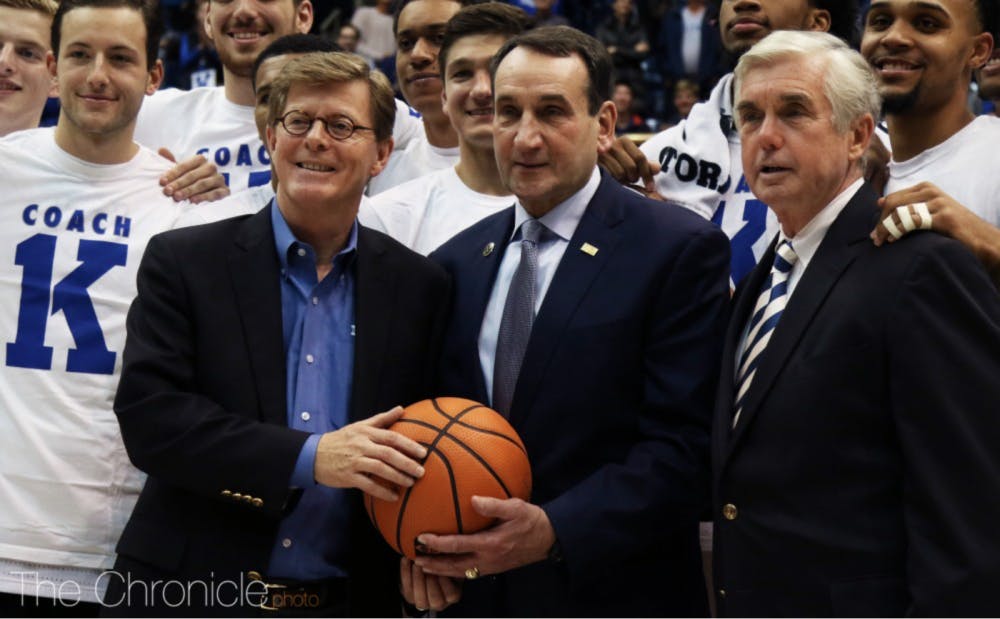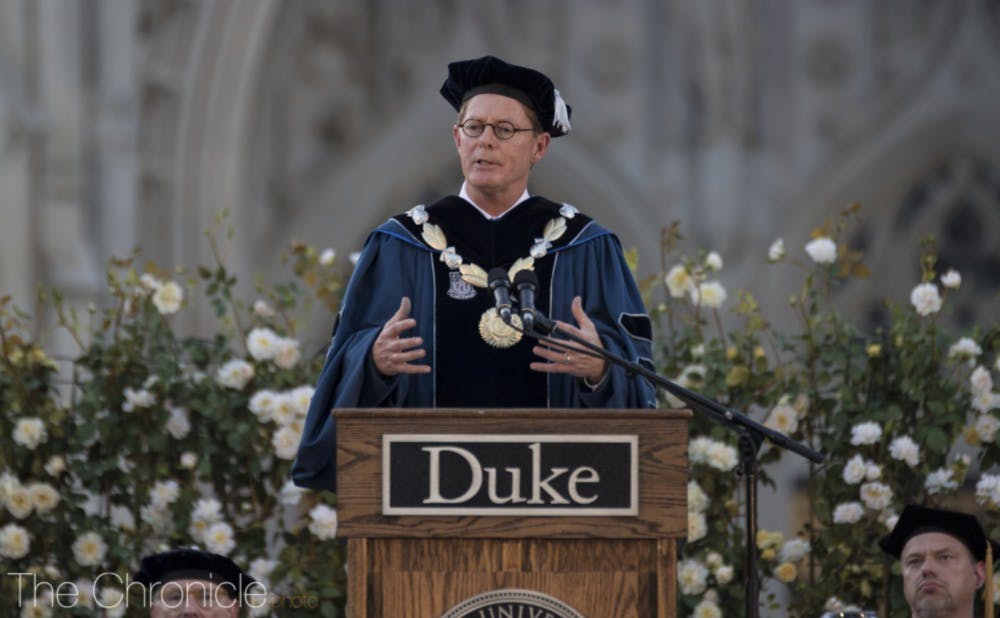Vincent Price took over as Duke's 10th president last summer. As he passes the "first year" mark, we talked with him about his experience at Duke, his takeaways from the first year and his plans going forward.
This interview has been edited and condensed for clarity.
The Chronicle: In your first interview with us, right after you were announced as Duke’s next president, you said you were “exhilarated, just so excited to be here.” It’s been just more than a year since you officially became Duke’s president—how are you feeling now?
Vincent Price: To quote the great James Brown, I feel good. Duke has turned out to be every bit as exhilarating as I hoped and expected a year ago. We’re doing very important work, some of the most important work in the world—educating students and discovering new knowledge, caring for the sick, building communities here in Durham and around the world, creating opportunities for people to improve their lives and, of course, society. And we get to do it here in this beautiful setting in Durham.
I can’t imagine anything more inspiring than traveling up Chapel Drive in the morning and seeing the Chapel towering over the trees. It’s wonderful.
TC: What are the biggest ways in which your first year leading Duke has influenced you as a person—your views on leadership, your values?
VP: I keep coming back to the Duke culture—that unique, and I think, special mix of collaboration and compassion. And more so than any other place I’ve worked, Duke feels to me like a community and family. We celebrate, we compete, we argue sometimes. But at the end of the day, everyone here wants Duke to be the best it can be.
So my job is to amplify those values and to help our faculty and staff to achieve their goals.
TC: What is the toughest decision you’ve made in your first year here?
VP: I’m not sure which decision has been the most difficult, but I think that some of the most important decisions I’ve made relate to selecting new leaders in our community.
I’m thrilled that we are welcoming two outstanding new vice presidents to Duke in Stelfanie Williams, our new vice president for Durham affairs, and David Kennedy, our vice president for alumni affairs and development. With Sally Kornbluth as provost, I’ve had the opportunity to bring three new outstanding deans to her team—Dean of Law Kerry Abrams, Dean of Sanford Judith Kelley and Toddi Steelman, dean of the Nicholas School.
Every day as president, you have to consider potentially difficult decisions about people and resources, space, priorities and the like. But I’m fortunate to have a great team of senior leaders, becoming stronger all the time, and to have the opportunity to work with them to understand the options and make the best decisions for Duke.
TC: In the interview I referenced a minute ago from when you were named Duke’s president, you said that “the best response to problematic speech and behavior is more speech.” That’s an issue that came to the forefront of campus dialogue at the end of the school year. What is your view on a hate speech policy? What is your perspective about the best response to problematic speech?
VP: Well, you’ve identified, I think, one of the big questions of the day, not just at Duke but indeed around the world.
I am not in favor of speech codes, as it were, or other constraints on expression. But, I am in favor of looking to build a very strong culture, grounded in mutual respect, open debate, of holding people accountable for their actions and having a supportive environment.

TC: This question comes from a student: “Do you believe Duke has a moral obligation to combat wealth inequality through its admissions and financial aid policy? What new institutional commitments do you plan to make to admissions and undergraduate financial aid during your first capital campaign?”
VP: This has long been a part of Duke University’s mission. Mr. Duke said it best perhaps when he created the indenture of trust, in saying that he believed education, when conducted along the sane and practical as opposed to dogmatic and theoretical lines, is the greatest civilizing influence.
That is why Duke has a policy to admit students without regard to ability to pay, that is need-blind admissions, and meeting the full demonstrated financial need of all our admitted students. Only a few handfuls of universities in the country, literally, have made that same commitment.
So we already invest $180 million per year on undergraduate financial aid. That number will continue to grow. We’ve created the Rubenstein Scholars, which include 60 first-gen, low-income students.
Get The Chronicle straight to your inbox
Sign up for our weekly newsletter. Cancel at any time.
But this is a very high priority to me as president. We have to do more to ensure that Duke is accessible and affordable for all. So I will continue to raise funds to support our financial aid commitments and to develop the strongest possible outreach programs possible.
TC: What are some of the things that surprised you most about your first year here?
VP: I was not so much surprised because I had learned of the energy here and the willingness of people to form strong partnerships to get things done. I have been very impressed and I would say surprised at the extent to which this is the case.
Duke, as a university, collaborates extraordinarily well with local government, UNC, NC State, NCCU. That, in my experience, is not typical in higher education. I’m gratified to find such a strong culture of collaboration and partnership.
TC: In April, the People’s State of the University launched as a campus movement by disrupting an alumni reunion event while you were at the podium. What was going through your mind at that moment? Now, what is your view on campus activism?
VP: Activism is a healthy and necessary part of any University community. I was thinking then, and I think now, dialogue has to come before disruption. Rights to express ourselves need not come at the expense of others’ right to speak, to work and to study. We need to strengthen our capacity for dialogue, and I think we can as a community practice ways of reaching out across divides in a climate of mutual respect.
I hope we can do this without disrupting and interrupting other people when they are attempting to speak.
TC: Tell me how you view the relationship between Duke and Durham? What are your goals for that relationship?
VP: My goal is to build on partnerships we have established over time, and to work with Durham as we confront the challenges facing Durham but also the opportunities presented by Durham. It is a diverse, vibrant community becoming economically vibrant, but it faces challenges related to education and affordable housing—we're also making sure we invest in early childhood education.
These are not challenges that are unique to Durham, but I think Durham and Duke are in a unique position to address them in a partnership. So I’m very excited about the programs that are already taking place, but also the opportunities to continue to collaborate and extend our partnership moving forward.
I enjoyed my first year meeting with members of city council, the mayor. Today, I met with the leader of our housing authority. There’s a palpable understanding of the value in having Duke work as a partner in our community. So I feel very good about this, and returning to the indenture of trust that created the University. We’re created to develop the resources of our region, and I feel we are very much doing that. So it’s one of the exciting parts of my role as president and our role as students, faculty and staff of Duke.
TC: What do you think Duke can do to be a more inclusive campus? How do you plan to work towards that?
VP: As I said before, I think we can, as a community, practice ways of making sure that we value every single member of our community—that we reach out and get to know each other better, talk to and understand each other.
To address whatever divides us as a community in a climate of mutual respect, and we should never declare victory in making Duke a more inclusive campus. There’s always more work to be done along those lines.
TC: Last week you were in Washington meeting with legislators and students. What are the main political issues you’re concerned about right now in relation to Duke? What are you watching for on the national level?
VP: Well, we live in a very interconnected world, and there is much happening in Washington that affects Duke—from educational policy and student aid, to healthcare, support for research, to immigration policy and foreign policy. While I was in Washington, I had the chance to meet with our congressional delegation, as well as some of our alumni in Congress, to talk to them about the ways Duke makes a difference in society because of—and sometimes in spite of—public policies.
It’s no secret that higher education has some political challenges in these polarized times. And that is why we have to tell our story effectively, talk about the opportunity as well as the impact of various policies for students and society.
I was pleased to see strong support for our research mission through support for research funding. We are watching immigration policies very carefully because they affect us in a wide variety of ways, and we continue to advocate very strongly for access programs and student aid programs.

TC: Pretty soon you’ll be welcoming the Class of 2022 to campus. What do you want to tell them? What are some things you hope they know as they come to campus?
VP: I will tell them what I assume many people will tell them, which is to use this opportunity at Duke to explore new ideas, reach out and meet new people. Tap into all the diversity—socially, educationally—that is available to them as a student at Duke. It is a precious moment, and they should seize that moment.
I would also give them advice that is standard for me, that is to get some sleep! I believe this very sincerely, that all of us have a tendency to become over-worked, over-involved and drawn in too many directions. Oftentimes, the first thing we lose sight of is the need to step back, enjoy some quiet time, stay healthy.
TC: Your glasses have become somewhat iconic on campus. What’s the story behind them?
VP: I’ve been wearing glasses since 5th grade, when I struggled to pass a regular vision exam conducted by the nurse at my school. I’ll tell you it was not a welcome turn of events.
But eyeglasses have been, ever since then, a part of my life. My wife encouraged me to try contact lenses when I went to graduate school. But they weren’t for me.
I gravitated towards round glasses after high school, and have been wearing one or another set of round glasses for over 40 years. So they have become very much a part of me at this point.
TC: If you could go back and tell yourself one thing before your first day on the job, what would you tell yourself?
VP: I actually tell myself this many mornings before I come to work: ‘You are the luckiest man on the planet, and you are going to love Duke.’
Bre is a senior political science major from South Carolina, and she is the current video editor, special projects editor and recruitment chair for The Chronicle. She is also an associate photography editor and an investigations editor. Previously, she was the editor-in-chief and local and national news department head.
Twitter: @brebradham
Email: breanna.bradham@duke.edu

